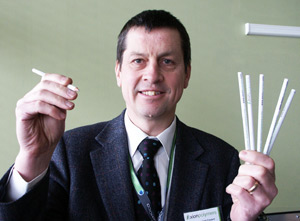AXION POLYMERS
Recycled polymer replaces virgin PS for BIC pencils / Material sourced from waste refrigerators / Cooperation with Ineos Styrenics
 One UK fridge makes up to 640 pencils – Keith Freegard with the plastic pencils (Photo: Axion Polymers) |
Recycled polystyrene supplied by Axion Polymers (Salford, Manchester / UK; www.axionpolymers.com) is being used by global stationery products manufacturer BIC (www.bicworld.com) for its new “Ecolutions” range of sustainable wood-free pencils. The material grade “Axpoly PS01” is sourced from scrap consumer refrigerators.
It was able to meet BIC’s materials specification after Axion worked closely with Ineos Styrenics (Fribourg / Switzerland; www.ineosstyrenics.com) to develop a formulation meeting various environmental and regulatory standards, as well as the manufacturer’s requirements for a cost-effective "green" product that would appeal to environmentally-conscious customers.
BIC introduced its coextruded all-plastic pencil some 10 years ago but has now changed the virgin PS for Axion’s recycled polymer, increasing the product’s sustainability. The pencil’s casing looks and behaves just like conventional cedar wood and can be sharpened in a conventional pencil sharpener without splintering. Up to 640 pencils can be made from a typical recycled refrigerator, according to Axion, who has calculated that BIC will save 3,200 t of carbon dioxide emissions annually by switching to recycled polymer.
Axion director Keith Freegard says the Ecolutions pencil is a really interesting story of product development in relation to changing consumer environmental awareness. An essentially disposable item is now being made more sustainable by the use of fully recycled polymer. In future, other products such as disposable pens and razors could benefit from a similar change of material.
A wooden pencil is essentially renewable but cedar is a slow-growing wood now seen by BIC as unsustainable for a short-life, consumer product. Furthermore, the traditional production process for a graphite-leaded, wooden pencil is slow and involves high levels of wastage.
It was able to meet BIC’s materials specification after Axion worked closely with Ineos Styrenics (Fribourg / Switzerland; www.ineosstyrenics.com) to develop a formulation meeting various environmental and regulatory standards, as well as the manufacturer’s requirements for a cost-effective "green" product that would appeal to environmentally-conscious customers.
BIC introduced its coextruded all-plastic pencil some 10 years ago but has now changed the virgin PS for Axion’s recycled polymer, increasing the product’s sustainability. The pencil’s casing looks and behaves just like conventional cedar wood and can be sharpened in a conventional pencil sharpener without splintering. Up to 640 pencils can be made from a typical recycled refrigerator, according to Axion, who has calculated that BIC will save 3,200 t of carbon dioxide emissions annually by switching to recycled polymer.
Axion director Keith Freegard says the Ecolutions pencil is a really interesting story of product development in relation to changing consumer environmental awareness. An essentially disposable item is now being made more sustainable by the use of fully recycled polymer. In future, other products such as disposable pens and razors could benefit from a similar change of material.
A wooden pencil is essentially renewable but cedar is a slow-growing wood now seen by BIC as unsustainable for a short-life, consumer product. Furthermore, the traditional production process for a graphite-leaded, wooden pencil is slow and involves high levels of wastage.
01.04.2011 Plasteurope.com [219034-0]
Published on 01.04.2011
